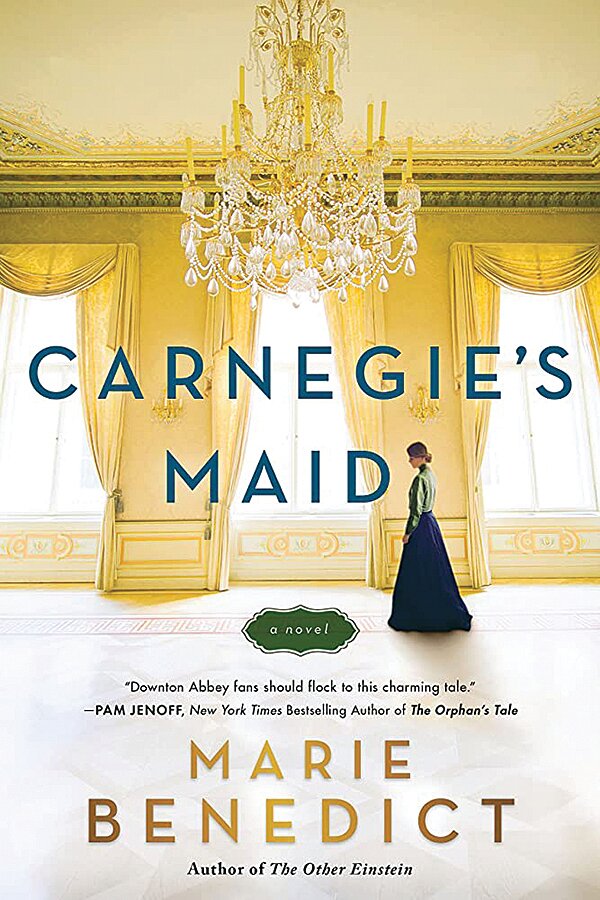A charming and romantic tale of America’s first great philanthropist
Once again Marie Benedict demonstrates her considerable writing skills in her latest novel, “Carnegie’s Maid.” As in her previous book, “The Other Einstein,” she develops her characters so as to make them come alive.
This item is available in full to subscribers.
Please log in to continue |
Register to post eventsIf you'd like to post an event to our calendar, you can create a free account by clicking here. Note that free accounts do not have access to our subscriber-only content. |
Day pass subscribers
Are you a day pass subscriber who needs to log in? Click here to continue.
A charming and romantic tale of America’s first great philanthropist
‘Carnegie’s Maid’
By Marie Benedict
Once again Marie Benedict demonstrates her considerable writing skills in her latest novel, “Carnegie’s Maid.” As in her previous book, “The Other Einstein,” she develops her characters so as to make them come alive. In the former novel she wove an intriguing and engrossing tale of the young scientist Albert Einstein; in this one, she focuses on the early years of steel tycoon Andrew Carnegie.
Both are historical figures, were brilliant men, although in different realms – one in science, the other in industry. Both are based on real persons and events to which Benedict adds a female figure, in the former book Mileva, Einstein’s equally brilliant wife. In this book she creates a fictional Irish immigrant maid, Clara Kelly, who enters the household to tend exclusively to Andrew’s mother, who is a force in her own right.
The author portrays Mrs. Carnegie as a shrew businesswoman, the impetus for the family’s advancement both in business and society. As she fully develops these various characters, Benedict simultaneously creates human interest in their private lives.
In “The Other Einstein” the author evokes the reader’s sympathy for Albert’s disregard for his wife, as well as outrage that he claims total credit for work on which she was an equal partner. Although Carnegie too was said to be a ruthless, ambitious figure, Benedict reveals a softer side through the introduction of this fictional servant, who points out to him that despite their extreme difference in status, he too originated from very humble roots.
In their interactions, she seems to be the only one with whom he can be honest; and as they share confidences, she encourages him to be cognizant of the dire conditions of the indigent who labor in his factories.
To all this, Benedict adds an element of suspense, as Clara is not who she pretends to be and has secrets of her own. Fearful of losing her much needed job, as it supports her entire impoverished family, she lives in daily tension that her low-bred origins will be revealed. To this plot, the author introduces the stirrings of a romance between Andrew and Clara which creates intense conflict as such a union between master and servant would be ill-advised at any time period, but especially during the late 1800s when this was supposed to be taking place.
Moreover, there is a female rival for Andrew’s attention who resents the close relationship between the couple, who is capable of jeopardizing Clara’s position in the Carnegie household. Added to that pressure is the fact that Clara’s relatives have lost their jobs and meager incomes because of Andrew’s actions combining two steel plants into one. This engenders ambivalent feelings as Clara sees such opulence and ostentation in the Carnegie home and lifestyle while those she loves are starving and struggling.
In the hands of this author, Clara’s influence on the young tycoon transforms Andrew from a man intent on ever increasing his own fortune to a philanthropist dedicated to improving life for the lower classes. Carnegie’s creation of free libraries all over the country was one of his most generous bequests, and there were many more instances of his altruism.
This is a charming and romantic tale through which the reader is able to visualize a certain time and place in our country’s history. In addition, it provides historical information about the first real philanthropist in America. Andrew Carnegie’s rise from a penniless Scottish immigrant to the richest man in America makes for inspiring reading. Credit to Benedict for another informative book derived from her considerable story-telling skills.
Donna Bruno is a prizewinning author and poet recently recognized with four awards by National League of American Pen Women.






